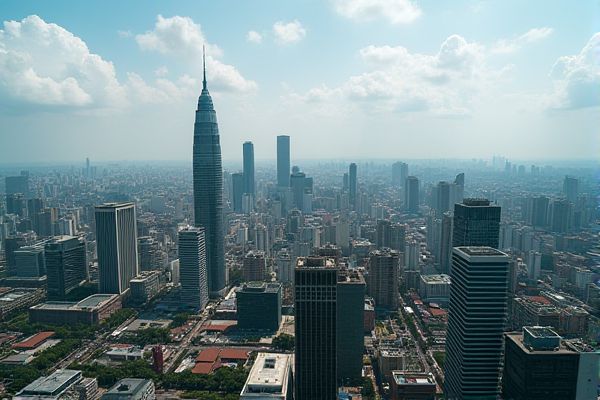
Utilities setup and providers in Indonesia: Electricity provider: PLN. Water supply: PDAM. Gas options: LPG or piped. Internet providers: Indihome, First Media. Mobile operators: Telkomsel, XL. Prepaid electricity: token system. Payment methods: bank transfer, e-wallet. Customer service: local language preferred. Essential documents: ID, residence proof. Connection fees: vary by provider.
Electricity provider: PLN.
PLN (Perusahaan Listrik Negara) is the Indonesian state-owned electric utility company, wholly owned by the Government of Indonesia, holding a monopoly on electric power distribution and generating the majority of the country's electrical power. It operates across various segments including power generation, transmission, distribution, and retail sales of electricity, serving approximately 84.8 million customers and controlling extensive transmission and distribution lines. For further insights, visit the official website of PLN to understand their vast reach and services in the nation's power sector.
Water supply: PDAM.
In Indonesia, PDAM (Perusahaan Daerah Air Minum) is the local water utility responsible for providing water supply services. PDAMs operate under various regional governments and offer services such as online bill payments, transparent meter readings, complaint submissions, and new customer registrations, often facilitated through integrated digital platforms like PDAM Info and PDAM Pintar to enhance operational efficiency and customer service.
Gas options: LPG or piped.
In Indonesia, the government is expanding the natural gas pipeline network, particularly in rural areas, to reduce reliance on imported Liquefied Petroleum Gas (LPG) and lower related subsidies. This initiative aims to decrease LPG imports and subsidies by increasing the use of piped natural gas, with a focus on using locally produced materials and enhancing national energy security.
Internet providers: Indihome, First Media.
In Indonesia, key internet providers include IndiHome and First Media. IndiHome, offered by Telkom, provides a Triple Play service consisting of home phone, high-speed internet, and IPTV services, with a comprehensive fiber network connecting various islands. First Media, part of the Lippo Group, offers integrated media services through its TriplePlay concept, including Internet (FastNet), pay TV (HomeCable), and high-speed data communications (DataComm), with a strong focus on cable television and internet services.
Mobile operators: Telkomsel, XL.
Telkomsel, the largest mobile operator in Indonesia, was founded in 1995 and is owned by Telkom Indonesia and Singtel. It offers a wide array of services including prepaid and postpaid plans, as well as cutting-edge 4G and 5G services, with a vast network covering over 170 million subscribers. While XL Axiata is another major competitor in the market, Telkomsel dominates with an impressive market share. This dominance is a testament to its robust infrastructure and extensive reach across the region.
Prepaid electricity: token system.
In Indonesia, the prepaid electricity system, known as "Listrik Prabayar" or "Smart Electricity," requires customers to purchase tokens in advance. These tokens can be bought through various methods, including smartphone applications such as Gojek, Bisabayar, and Tokopedia, as well as ATMs of several banks like Bank Mandiri, Bank BNI, Bank BRI, and Bank BCA, and online utility bill payment counters. Customers input the 20-digit token number into their prepaid meter to activate the electricity, allowing real-time monitoring and control over their consumption. For a comprehensive guide on how to navigate this system, you can refer to the informative article on the Irapoenya Blog.
Payment methods: bank transfer, e-wallet.
In Indonesia, utilities such as prepaid electricity can be paid through various convenient methods, including bank transfers via online banking or ATM, and payments at mini markets, post offices, or online shopping sites like Tokopedia. Additionally, e-wallets and mobile payment apps like GoPay or OVO are widely used for various transactions, including bill payments.
Customer service: local language preferred.
In Indonesia, utilities and other businesses can leverage call center services from providers like Fusion CX, which offer customer support in local languages, including Indonesian, and cater to various industries with multilingual and omnichannel communication solutions.
Essential documents: ID, residence proof.
To set up utilities in Indonesia, essential documents include an IMB (Building Permit), proof of utility connections, zoning compliance, and inspection reports. Additionally, for the legal use of a building, a Building Use Permit (SLF) requires documents such as building plans, utility connections, and proof of residence or property ownership. For more detailed guidance, you can visit The Bali Lawyer, which provides invaluable resources on obtaining permits in Indonesia.
Connection fees: vary by provider.
In Indonesia, connection fees and electricity costs vary by the type of tariff and the power connected, with different rates for domestic, business, and industrial users. Additional charges are also applicable, including minimum use fees and a 5% street lighting charge. For detailed information on these costs, you can visit the Electricity Costs in Indonesia page. Understanding these variations is crucial for managing budgets effectively, whether for households or businesses operating in the region.
